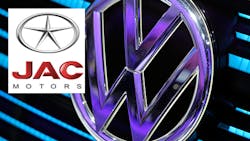VW Plans Electric Car Joint Venture With Chinese Jianghuai
Volkswagen AG is assessing the feasibility of an electric car joint venture with China’s Anhui Jianghuai Automobile Co., potentially adding a third partner in its largest market and advancing efforts to meet stricter fuel economy and emissions standards.
Jianghuai and Volkswagen are evaluating a potential venture in which each owns 50%, according to a statement Wednesday to the Shanghai Stock Exchange. The two companies signed a memorandum of understanding a day earlier in Wolfsburg, Germany, where Volkswagen is based, and aim to sign a formal agreement within five months.
“This a positive development for the China auto industry, as more local automakers gain access to EV technology,” said Steve Man, an autos analyst at Bloomberg Intelligence in Hong Kong. A tie-up with Jianghuai also would expand Volkswagen’s footprint in China, where it already has passenger-vehicle ventures with SAIC Motor Corp. and China FAW Group, he said.
VW CEO Matthias Mueller hasn’t pulled back from spending on Volkswagen’s largest market despite the company having set aside 17.8 billion euros ($20.01 billion) to cover costs of fixing diesel cars and the legal risks related to its emissions scandal. The automaker has said it’ll invest more than 4 billion euros ($4.50 billion) in China this year and introduce 15 new-energy vehicles to the market within five years.
“This cooperation would not only benefit our two organizations, but would also be of great value to our customers, a sound environment and the Chinese society in general,” Mueller said in a statement. Volkswagen shares rose as much as 1.2% in Frankfurt.
China requires overseas companies to set up businesses with domestic partners as part of an industrial policy to ensure local carmakers gain technology and operational know-how. Volkswagen and Jianghuai said both existing and future model platforms and technologies could be used to bring products to market.
Jianghuai Auto, among the top sellers of EVs in China, is also one of the last major Chinese carmakers without a foreign venture partner. Chairman An Jin had said in an interview in March that the company was in negotiations with Volkswagen.
Boosting the number of electric vehicles it sells in China would help Volkswagen meet stringent emission and fuel-economy standards. The government has mandated the lowering of average fuel consumption to 5 liters per 100 kilometers (1.32 gallons per 62 miles, about 46.97 miles per gallon) by 2020, from 6.9 liters per 100 km (about 34.07 miles per gallon) this year.
A VW-Jianghuai venture would follow Daimler AG’s partnership with BYD Co. to develop electric cars for China under the Denza brand. BMW AG and its local partner Brilliance China Automotive Holdings Ltd. also have the joint venture Zinoro nameplate for electric vehicles.
About the Author
Bloomberg
Licensed content from Bloomberg, copyright 2016.
